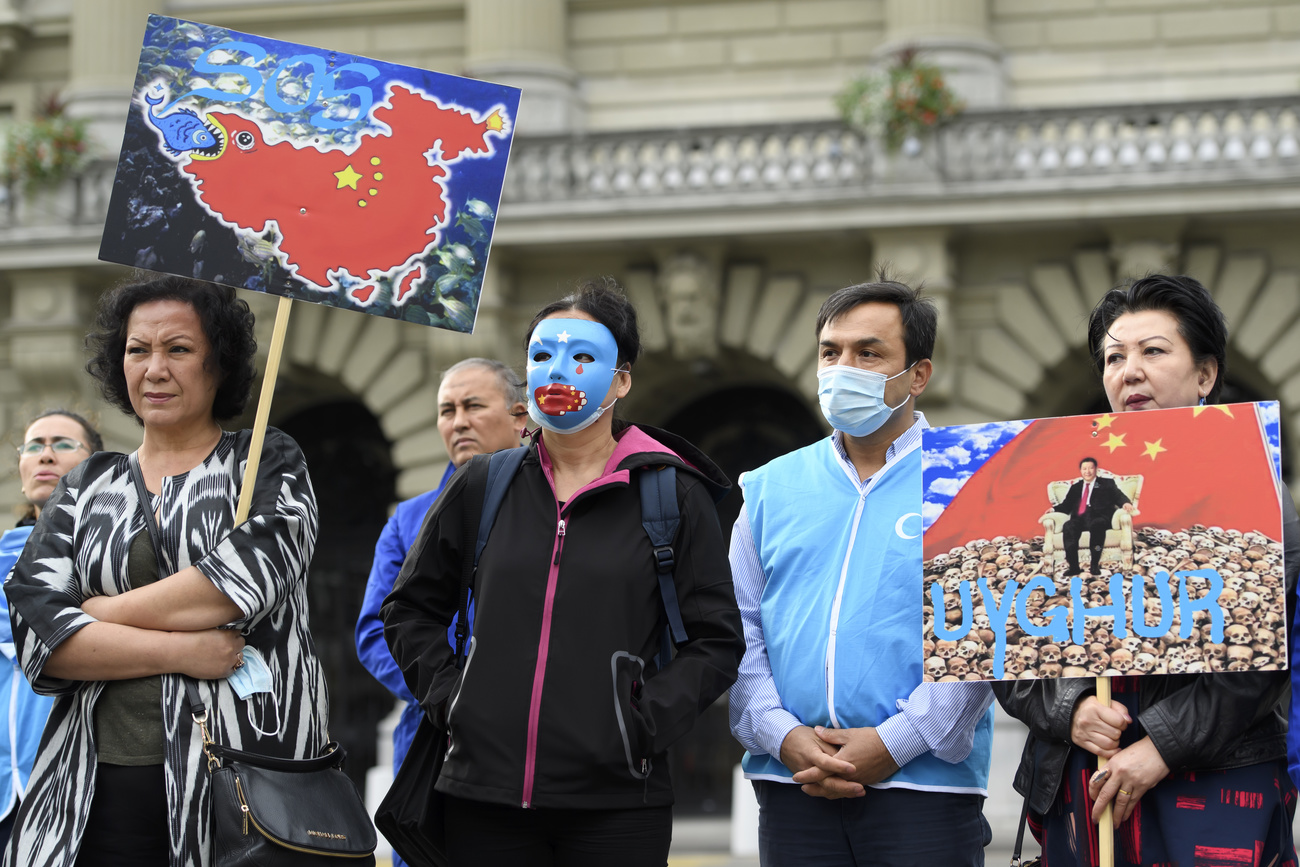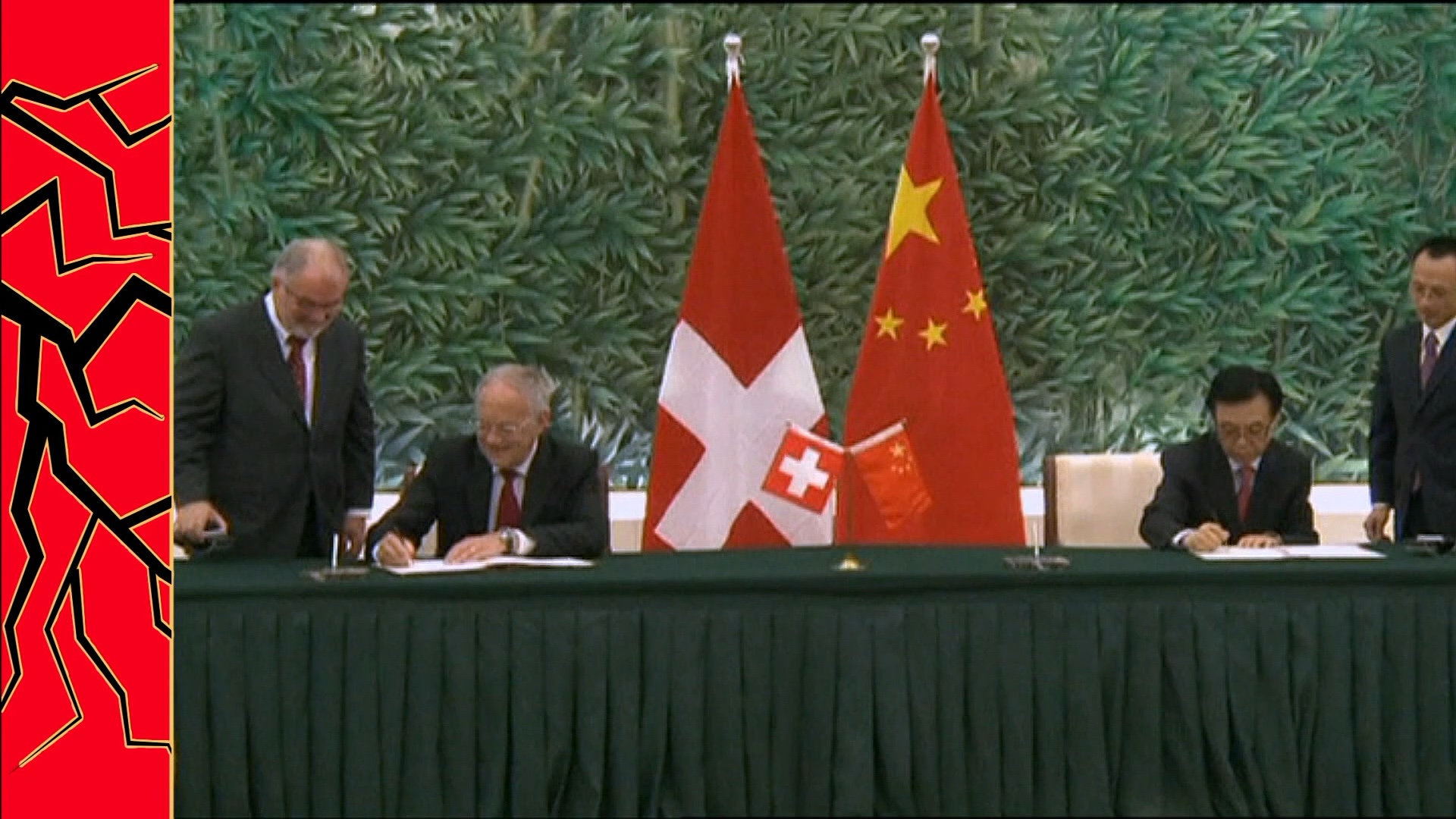Timeline: 75 years of Swiss-Chinese relations between business and human rights

Seventy-five years ago, Switzerland became one of the first Western countries to recognise the newly founded People's Republic of China. Its aim was to gain privileged access to a potentially huge market.
China has been labelled by a former NATO secretary-general as the leader of a “new axis of evil”. External link Switzerland is a small democratic country that has always adhered to the principle of neutrality. Their 75 years of diplomatic relations have been mostly friendly, despite a cold spell after the Tiananmen Square massacre in 1989.
After publicly criticising China’s human rights record in 1999, Switzerland became the first European country to sign a free trade agreement with the Asian country in 2013, with the aim of obtaining privileged market access.
Switzerland unveiled a China strategy for the first time in 2021, in which it questioned its business-friendly approach in light of reports of “a deteriorating human rights situation in China”.
It has so far refrained from following European Union countries in sanctioning the country for abuses against the Uyghur minority.
A warm relationship during the Cold War
- January 17, 1950: Switzerland recognises the People’s Republic of China
The 75 years of diplomatic relations between Switzerland and China began with a telegram. On January 17, 1950, the then-Swiss president, Max Petitpierre, wrote to his Chinese counterpart Mao Zedong, expressing Switzerland’s willingness to establish diplomatic relations: “[The Swiss government] has today de jure recognised the central government of the People’s Republic of China, with whom it will soon establish diplomatic relations”. This made Switzerland one of the first non-Communist European countries to recognise Mao’s regime, shortly after the United Kingdom and the Scandinavian countries did so.

It was a bold move. On October 1, 1949, after winning an eight-year long civil war, Mao proclaimed the founding of the People’s Republic of China, the Communist country with the world’s largest population. As a result, the nationalist Chiang Kai-shek fled to the island of Taiwan and founded the Republic of China. Both struggled for international recognition.
On October 7, 1949, Switzerland decided that as soon as 20 or 30 countries recognised the People’s Republic of China, it would follow suit.
Swiss historian and political scientist Regula Stämpfli attributes Switzerland’s relatively early recognition of the People’s Republic of China to its awareness of China’s enormous potential and its key geopolitical position. “Due to the loss of American influence in China, the Swiss economy could expect to face less competition in the Chinese market, a situation that had to be exploited as soon as possible[…] By recognising Red China, Switzerland could pursue a credible and neutral foreign policy and gain more space for its independent position,” wrote Stämpfli in her book Switzerland and China, 1945-1950External link.
- September 14, 1950: Establishment of diplomatic relations between China and Switzerland
China and Switzerland officially established diplomatic relations, exchanged envoys, and opened embassies in each other’s capitals. In January 1956 and April 1957, the two countries respectively upgraded their diplomatic missions from legation level to embassy status and exchanged ambassadors.

- 1960s-1974: Maintaining contacts with an isolated country
In the 1960s China was politically isolated due to economic sanctions imposed by the United States. It also had several border clashes with the Soviet Union that led to colder relations with its communist neighbour.
In 1961, Chinese Vice-Premier Chen Yi visited Geneva and Bern, and in 1973, Premier Zhou Enlai received former government minister Max Petitpierre in Beijing. The Swiss Industrial and Watch Exhibition had already been held there in 1968.
- 1974:The starting point for exploring an unknown market
Economic missions, especially those led by government ministers, have long been an instrument of Swiss foreign economic policy.
The first Swiss economic mission to China, led by politics minister Pierre Graber, took place in 1974. At that time, China was still an unknown market to the Western world.
Economic ties were strengthened on December 20, 1974, with the signing of a Treaty on Commerce and Trade between the two countries. The most important article guaranteed reciprocal most-favoured-nation treatment.

- In the late 1970s and 1980s: Deepening economic and political ties
The economic relationship accelerated dramatically after 1978, in parallel with the economic reforms initiated by Deng Xiaoping, who led China to open up its economy after Mao’s death.
The special relationship between the two countries led many Swiss companies to enter the Chinese market earlier than their competitors. For example, the Swiss watchmaker Rado etched its name into the history of China in 1979 when it became the first foreign watch brand to advertise on Chinese television. Likewise, the Swiss elevator manufacturer Schindler established the first Western industrial joint venture with a Chinese partner in 1980.

Human rights issues take centre stage
- 1989: Reflecting on its relations with China
The political crackdown in Tiananmen Square and other Chinese cities on June 4, 1989, in which thousands of demonstrators and students were killed, came as a shock to many governments, including the Swiss. It was the first time that Switzerland publicly criticised China’s internal politics as a violation of human rights. Immediately after the crackdown, Bern imposed a ban on arms exports and froze a previously agreed arms shipment. But Swiss officials were quick to say that they were not considering economic sanctions.
- 1991: Human rights on the table
Since 1991, China and Switzerland have held an annual bilateral human rights dialogue, focusing on criminal law, criminal procedure and the penal system, minorities and religious freedom, human rights defenders and international human rights issues.
- 1999: China’s first state visit to Switzerland
China’s first state visit to Switzerland, initially peaceful, turned into a diplomatic crisis.
On March 25, 1999, Chinese President Jiang Zemin was confronted by pro-Tibetan demonstrators as he arrived at the parliament building in Bern. They were protesting, among other things, against China’s annexation of Tibet in 1949. His host, then-Swiss President Ruth Dreifuss, later continued to engage Jiang on human rights, infuriating her Chinese counterpart. In his speech to the Swiss parliament, Jiang lashed out at the Swiss authorities, accusing them of failing to maintain order: “You have lost a friend!” he declared.

Time for trade
- 2007: Recognition of China as a full market economy
Doris Leuthard, then the economics minister, led a business delegation to China. During the trip, she announced that Switzerland officially recognised China as a full market economy within the World Trade Organization (WTO). China and Switzerland started to evaluate and study the possibility of signing a free trade agreement.
This decision was very important for China, as it allowed China to avoid dumping cases at the WTO. Both the EU and the US still don’t consider China to be a market economy as defined by the WTO.
- 2013: The conclusion of a free trade agreement
A bilateral free trade agreement (FTA) between Switzerland and China, which was signed in Beijing in July 2013 and entered into force on July 1, 2014, was Beijing’s first such deal with a country in continental Europe.
In Switzerland, proponents of the agreement emphasised the benefits for Swiss corporations, which would enjoy simplified access to the Chinese market and a head start over their European competitors. The FTA with China grants Swiss companies market access in China, and protection of investments and of intellectual property. However, Swiss left-wing parties and NGOs criticised the FTA and called for it to be renegotiated. They requested explicit provisions on human rights and labour protection to be included in the text of the treaty.
‘Clear differences in values between the two countries’
- 2019: The beginning of a four-year gap
Annual human rights talks between the two countries stalled after Beijing objected to a letter co-signed by Switzerland at the United Nations, which called for the closure of “re-education camps” for the Uyghur minority in China’s Xinjiang region. In the open letter, Switzerland and 21 other Western nations also urged China to allow the Office of the United Nations High Commissioner for Human Rights (OHCHR) to send experts to visit.
- 2021: First-ever China foreign policy strategy
The Swiss government adopted its first China foreign policy strategy (2021-2024)External link, which was intended to create “greater coherence” in its relations with Beijing. The strategy recognised China as an important partner for Switzerland’s foreign policy and as Switzerland’s third-largest trading partner. “However, there are also clear differences in values between the two countries. Therefore, it is crucial to ensure that the policy towards China is clear and consistent,” the strategy said.
Swiss Foreign Minister Ignazio Cassis said that “China’s willingness to have a dialogue on human rights has lessened, while the human rights situation in the country has got worse.” He stressed that that human rights would be addressed in all bilateral agreements.
- 2022: Refusal to comply with EU sanctions on China
In March 2021, the EU imposed sanctions on some Chinese individuals and companies for human rights abuses against the Uyghur minority. All EU countries and most Western countries, including the UK, the US, Canada, Iceland and Norway, adopted these sanctions. On August 31, 2022, then-UN High Commissioner for Human Rights Michelle Bachelet released a report finding “patterns of severe and undue restrictions on a wide range of human rights’ with a ‘discriminatory component’ against Uyghurs and other predominantly Muslim communities. It said this may “constitute international crimes, including crimes against humanity.”
Beijing rejected the findings as “based on disinformation and lies” and characterised the report as “wanton” slander.
However, despite pressure from the EU and the US, Switzerland decided in December 2022 not to impose sanctions.

More
Why is Switzerland refusing to follow EU sanctions on China?
- 2023: Resumption of the human rights dialogues
After a four-year hiatus, bilateral human rights dialogues resumed in Bern in 2023. Discussions covered several key issues, including freedom of expression, the rights of national, ethnic, religious and linguistic minorities – in particular the Uyghur and Tibetan populations – as well as women, the LGBTQ+ community and the situation in Hong Kong.
The Swiss foreign ministry had invited five NGOs, including the Uyghur Association of Switzerland, the Swiss-Tibetan Friendship Society, the International Service for Human Rights and Amnesty International, to take part, but China vetoed their participation.
Balancing access to the Chinese market and holding China accountable for human rights abuses
- 2024: Updating the free trade agreement
In September 2024, Switzerland and China officially launched negotiations to update their free trade agreement. In particular, Switzerland wants to revise the modalities of the agreement, in particular the export of its products, which are still heavily taxed.
Switzerland has also said that “obligation to respect fundamental values and principles of international relations and public international law (including democracy, freedom, social progress, justice and the rule of law)” was part of the negotiations.

More
Updated free trade deal between Switzerland and China set for 2025
Edited by Virginie Mangin/gw

In compliance with the JTI standards
More: SWI swissinfo.ch certified by the Journalism Trust Initiative














You can find an overview of ongoing debates with our journalists here . Please join us!
If you want to start a conversation about a topic raised in this article or want to report factual errors, email us at english@swissinfo.ch.